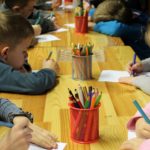 In Australia, kids from migrant and refugee families, especially those who speak languages other than English, need more help in their early education. A study from the University of South Australia says that the people taking care of these kids—like childcare workers—need extra training.
In Australia, kids from migrant and refugee families, especially those who speak languages other than English, need more help in their early education. A study from the University of South Australia says that the people taking care of these kids—like childcare workers—need extra training.
The South Australian government is doing something about it. They’re putting $56 million into making sure the folks working in early education, especially for three-year-olds and after-school care, are well-prepared.
Multiple langauges
More than one in four Australian kids (27%) speak more than one language at home. Surprisingly, these kids struggle the most with communication skills. A big chunk of young kids, around 30%, get informal childcare.
This can be unregulated and includes both paid and unpaid services, like community creches for kids aged from birth to 5 years old. The call for better training and support is vital for making sure all kids get the best start in their early education.
The researchers emphasize that the new government investments should include childcare settings that have more refugee and migrant families. They’re saying that these settings shouldn’t be left out of the support.
“All children deserve the best start in life, but migrant and refugee children often find it harder because they come from non-English speaking families and different cultures,” the researchers explain.
“When these children enter childcare, they find it difficult to connect, communicate, and play—not only with [caregivers], but also with their peers—which can delay the development of their social and emotional skills.”
Early support
In this research, staff and volunteers at community creches underwent 16 weeks of on-site professional learning led by experienced mentors. These mentors demonstrated strategies for social and emotional learning development specifically designed for children who speak languages other than English.
Even though childcare workers were already good at handling children’s emotions, the training introduced fresh approaches to enhance children’s emotional understanding. It also equipped them with effective strategies to support migrant and refugee children.
The study discovered that these professional learning sessions had significant positive impacts. Workers felt more ready to assist multilingual children, and families reported that their children were happier attending childcare and better prepared for school.
Almost 40% of kids starting primary school were learning English as an additional language. In Australia, approximately 25% of students begin school with English as their second language.
Vulnerable populations
The Australian Early Development Index points out an increasing vulnerability in children’s social and emotional development in areas with lower economic status, especially those with high numbers of migrant and refugee families where English is a second language.
“All children should feel secure and supported as they transition from their parents’ care to childcare, but the need is stronger among those who are more vulnerable,” the authors conclude.
“The government’s new support package will help upskill early childhood education and care workers, but it must also embrace providers of short-term community creche care in lower SES areas, where there are higher proportions of refugee and migrant families.
“All caregivers, educators and volunteers across all childcare services must be properly supported to ensure the best outcomes for developmentally vulnerable children.”